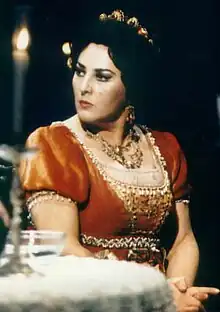Ghena Dimitrova | |
|---|---|
Гена Димитрова | |
 | |
| Born | 6 May 1941 Pleven, Kingdom of Bulgaria |
| Died | 11 June 2005 (aged 64) Milan, Italy |
| Resting place | Central Sofia Cemetery 42°42′41.4″N 023°20′05.8″E / 42.711500°N 23.334944°E |
| Education | Bulgarian State Conservatoire |
| Occupation | Opera singer (soprano) |
| Spouse |
Gheorghi Stojkov
(m. 1967; died 1991) |
Ghena Dimitrova (Bulgarian: Гeна Димитpова, 6 May 1941 – 11 June 2005) was a Bulgarian operatic soprano.[1][2] Her voice was known for its power and extension used in operatic roles such as Turandot in a career spanning four decades.[3][4]
Early career
Ghena Dimitrova was born in the Bulgarian village of Beglezh, some 25 km from Pleven, in 1941. She started singing in the school choir and her powerful voice led to her being offered a place at the Sofia Conservatory studying under Christo Brambarov between 1959 and 1964.[5] While she was initially classified as a mezzo-soprano, she was recognised as a soprano in her second year.
After finishing her studies at the Bulgarian State Conservatory, she started teaching singing. Her breakthrough came in 1967 as Abigaille in a Bulgarian National Opera production of Giuseppe Verdi's Nabucco after a couple of other sopranos dropped out. In the early recordings Dimitrova's voice had not yet reached its signature size, and in many of the early Nabucco productions, the final optional high C is omitted in the cabaletta, Salgo già, which she would include later in her career.
International career
Dimitrova won the Sofia International Singing Competition in 1970, the prize including a course of study at La Scala's Scuola di Perfezionamento.
She made her Italian debut as Turandot in Treviso in 1975, and essayed the same role for her 1983 La Scala debut opposite tenor Plácido Domingo in Franco Zeffirelli's lavish production. She also sang at the Teatro Colón in Buenos Aires in 1974-75, where she sang Tosca, Turandot, Andrea Chenier, Il trovatore and Don Carlo. Her Turandot is also preserved in a video of the Arena di Verona production from 1983, with Nicola Martinucci and Cecilia Gasdia. In 1987, she made her debut at the Metropolitan Opera in New York performing the same role.
Dimitrova once said of the role: "Turandot may not be my favorite part, but it shows off the voice to great advantage. The way the music is written, you need a voice like a trumpet to do it justice."
Her debut in the United States was in 1981 performing the role of Elvira in Ernani. She sang at the Barbican Arts Centre in Ponchielli's La Gioconda in 1983 before making her Covent Garden debut in the same year. Her late debut she later attributed simply to "politics".
Dimitrova also sang some mezzo-soprano roles in her repertory. The most notable of these were Amneris, which she did at La Scala's 1985 staging of Verdi's Aida opposite Maria Chiara in the title role and Luciano Pavarotti as Radames; and Eboli from Verdi's Don Carlo. [6][7]
After retiring from the stage in 2001, Dimitrova remained active working with young singers. One of her students is the soprano Elena Baramova.
Dimitrova died of cancer in Milan on 11 June 2005.[8] After her death the Bulgarian Government promised to establish a fund in her name for promising young singers.
Honours
Dimitrova Peak in Antarctica is named after Ghena Dimitrova.
Videography
- James Levine's 25th Anniversary Metropolitan Opera Gala (1996), Deutsche Grammophon DVD, B0004602-09
- Giuseppe Verdi: I Lombardi alla prima crociata (Teatro alla Scala,1984), Warner Music Vision DVD, 0927-44927-2
- Giuseppe Verdi: Nabucco (Teatro alla Scala, 1987), Warner Music Vision DVD, 5050467-0944-2-0
- Giuseppe Verdi: Aida (Teatro alla Scala, 1986), ArtHaus Music BR/DVD, 109087

References
- ↑ Goodwin, Noël (2001). "Dimitrova, Ghena". In Sadie, Stanley (ed.). New Grove Dictionary of Music and Musicians. Vol. 7 (2nd ed.). Macmillan Publishers Limited. p. 353.
- ↑ Blyth, Alan (27 June 2005). "Ghena Dimitrova, Obituary". The Guardian. Retrieved 6 May 2016.
- ↑ "Ghena Dimitrova, Obituary". The Telegraph. 13 June 2005. Retrieved 6 May 2016.
- ↑ Associated Press (13 June 2005). "Ghena Dimitrova, 64, Soprano Known for Powerful Voice, Is Dead". The New York Times. Retrieved 6 May 2016.
- ↑ "DIMITROVA, Ghena". The International Who's Who 2001 (64th ed.). London: Europa Publications Limited. 2000. p. 404. ISBN 1-85743-081-6.
- ↑ "Opera Diva Ghena Dimitrova".
- ↑ "Ghena Dimitrova".
- ↑ Гена Димитрова - момичето от село, което покори света (in Bulgarian)
External links
- Ghena Dimitrova at IMDb
- Official website
- Article at allmusic.com
- The New York Times - obituary
- Her page on the Stars of Bulgarian Opera site with 4 mp3 audio clips of selected arias
- Interview with Ghena Dimitrova, January 27, 1987
- Works by or about Ghena Dimitrova at Internet Archive
- Performance record: Dimitrova, Ghena on the MetOpera Database
- Ghena Dimitrova discography at Discogs